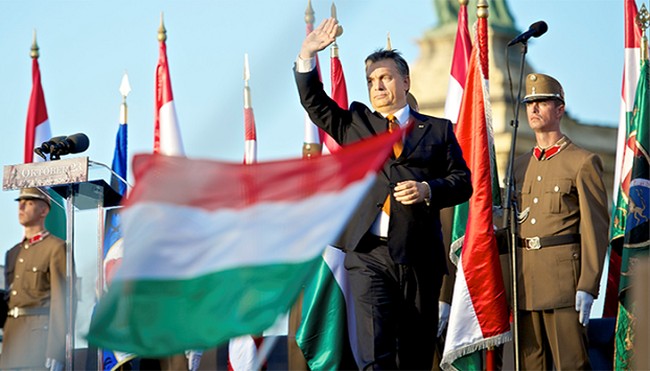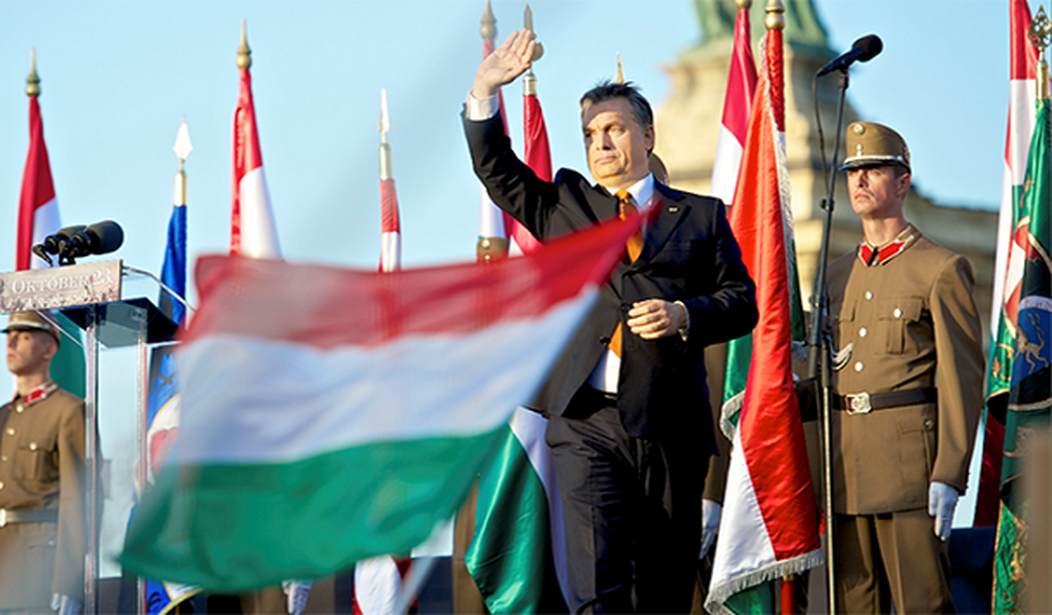 In a speech to his party’s faithful, Hungarian prime minister Viktor Orbán seemed to signal a course that would not only make Hungary’s continued membership in the EU problematic but would result in a government that looked to Moscow for leadership rather than Brussels and one that would be ruled more in the model of fascism that Vladimir Putin has installed in Russia than as a parliamentary democracy.
In a speech to his party’s faithful, Hungarian prime minister Viktor Orbán seemed to signal a course that would not only make Hungary’s continued membership in the EU problematic but would result in a government that looked to Moscow for leadership rather than Brussels and one that would be ruled more in the model of fascism that Vladimir Putin has installed in Russia than as a parliamentary democracy.
In a speech to Fidesz supporters in Romania on Saturday, Hungarian Prime Minister Viktor Orbán said “the era of liberal democracies is over”, and announced the formation of a parliamentary committee for the continuous monitoring of “foreigners who try to gain influence in Hungary”. “We are setting up a sort of a spiritual Iron Dome system, that is not to be breached by anyone,” Orbán told the crowd at Fidesz’s annual Hungarian Youth Free University at the Carpathian resort town of Baile Tusnad (Tusnádfürdő).
…
He called the global economic crisis of 2008 a “watershed in European history, comparable only to 1945 or 1990. The welfare state and society have exhausted their reserves. Nowadays, it consumes itself with indebtedness and this is no longer a sustainable form of existence in the West. It is not worth following this unsustainable model. Copying Western models is a kind of provincialism that will kill us,” he argued.
Acknowledging the many ethnic Hungarians present, Orbán said the 2014 national elections had “restored moral order” and been “just deserts” for those who voted against dual citizenship in the 2004 referendum. He reasoned that Hungarian votes from abroad had tipped the balance in favor of Fidesz retaining its two-thirds constitutional majority.
“We will try to find a method of organizing society which differs from dogmatic ideologies accepted in the Western world – a new Hungarian state capable of making our community a competitor once again in the great global race, for the coming decades.”
This new Hungary “will be a new labor state that will respect Christianity, freedom and human rights”. The era of liberal democracies is over, Orbán added, and listed China, India, Russia, Turkey and Singapore as countries that could offer Hungary inspiration. “Our time will come,” he concluded.
Orban was recently elected to a second consecutive term as prime minister and the party he founded, Fidesz, controls two-thirds of the seats in the Hungarian parliament. But Hungarian democracy is looking more and more like two wolves and a sheep voting on what to have for lunch than the ideal of majority-rule-minority-rights. Some of his actions come straight from Putin’s playbook.
Curbing NGOs
Much as Putin has cracked down on the activities of NGOs seeking to develop civil society in Russia, so, too has Orban lowered the boom on European NGOs in Hungary.
Orban said civil society organizations receiving funding from abroad need to be monitored as he considers those to be agents of foreign powers.
“We’re not dealing with civil society members but paid political activists who are trying to help foreign interests here,” Orban said. “It’s good that a parliamentary committee has been set up to monitor the influence of foreign monitors.”
Return to socialism
Orban has pursued a strategy of nationalizing Hungarian companies, particularly ones he deems critical, rather than allow their ownership to rest out side Hungary. This is a dangerous path to take with a huge economy. With an economy the size of Hungary’s it guarantees stunted economic growth but also sets up the perpetual bogeyman of foreign ownership of assets as a target to divert anger.
Restrictions on basic rights
As Orban’s party controls a two-thirds majority of the parliament it has been able to make changes to the Hungarian constitution which tend to tilt the playing field heavily towards that party. The Judiciary is no longer independent. Approval of a parliamentary committee is required before an religion can be recognized, this does make an unrecognized religion illegal but it cuts it off from state subsidies. Media outlets that agree to run political ads must do so free of charge. All media must be registered with the government and all content is subject to government approval. University students who receive financial aid must either stay in Hungary or reimburse the government.
Extra-territorial nationalism
Much as Putin has made the welfare of Russians living outside Russia an emphasis, so has Orban. He has boasted that the votes of Hungarians living abroad are what gave him his parliamentary super-majority.
In a reference to the several million Hungarians living outside Hungary, Mr. Orban said that in Hungary’s case the notion of nation doesn’t end at the country’s geographical borders. Hungary lost two thirds of its territory when the Austro-Hungarian empire disintegrated into an array of nation-states after World War I.
In the wake of the Russia-Ukraine crisis over territory, Mr. Orban said previously that Hungarians in Ukraine should get greater autonomy from Kiev. The remark sparked criticism from regional leaders, including from Poland’s Prime Minister Donald Tusk, who in the past supported Mr. Orban even when he faced bitter criticism from many European capitals. The Polish leader said Mr. Orban’s comment about autonomy for Hungarians in Ukraine was ill-timed, made when Ukraine was facing territorial claims by Russia.
Hungary’s neighbors, unsurprisingly given the history of the region, contain substantial Hungarian minorities and Hungary has taken an interest in their well-being.
Budapest, while broadly satisfied with the treatment of Hungarians in Ukraine, Croatia and Slovenia, believes their compatriots in Romania, Slovakia and Serbia are suffering systematic discrimination. Istvan Zalatnay, deputy head of the government’s Office for Hungarian Minorities Abroad, said that part of the problem was that the Romanian, Slovak and Serbian leaderships were Communists turned nationalists. ‘In this region now, the only ideology which can be presented as an alternative to democracy is nationalism. The old regimes and structures are still very strong, but they can no longer articulate themselves through Communism, so they choose nationalism. It’s a combination of the old forces with chauvinist ideology.’
Naturally, Romania, Slovakia and Serbia see things differently. They suspect that Hungary’s keen interest in their Hungarian minorities is a screen behind which Budapest is at best trying to interfere in their internal affairs and at worst planning territorial claims against them. All Hungary’s leading political parties reject expansionism, but it did not help matters when, in declaring their support for Europe’s existing frontiers, they added the qualifier ‘irrespective of whether or not they are just’. Similarly, Hungary’s neighbours seized on a remark by the Prime Minister, Jozsef Antall, that he was ‘in spirit’ the prime minister of all Hungarians wherever they lived, as evidence of expansionist ambitions. The three neighbours are equally unimpressed with suggestions that Hungarians abroad should be allowed to vote in Hungarian elections.
EU out — Russia in
In fairness to Orban, he doesn’t like the EU. So he isn’t all bad. And his dislike of the EU is not unusual among Hungarians. The EU is seen as a heavy handed, one-size-fits-all bureaucracy and they have seen money from the EU go to well connected contractors from other EU members rather than to Hungarian clients. Part of his ire at NGOs is driven by the view that these groups, not Hungary, has benefited from EU funding. Hungary has given Russia a no-bid contract to upgrade its nuclear power plant:
Hungary is enjoying an increasingly positive business relationship with Moscow, a senior government official said Thursday, days after the country awarded a contract to expand its sole nuclear plant to a Russian firm, going against wider European attempts to reduce reliance on Russian energy.
Rosatom will build two 1,200 megawatt units at a cost of 10 billion-12 billion euros ($13.6 billion-$16.3 billion) at Hungary’s state-owned nuclear plant MVM Paksi Atomeromu Zrt, with Russia providing a 32-year euro-based loan.
The deal will be partly financed by Russia under a bilateral agreement signed this week by Hungary’s Prime Minister Viktor Orban and Russia’s President Vladimir Putin.
The deal also means Hungary won’t hold a tender for the nuclear project, in which companies from France, South Korea and Japan were expected to bid. The move has also irked the European Union, which said it would review the plan and rule on whether it is admissible under the bloc’s competition rules.
Take him at his word
Very few people really know what Orban’s long range scheme is. Is he making populist noises to get a better deal out of the EU? Or does he see himself as a latter day Miklós Horthy? The visible signs are not good and one thing that we’ve learned over the years is that you need to take these people at their word. If they say they are going to kill Jews and slaughter Bolsheviks then you’re a damned fool to not listen to them. If they say that the era of liberal democracy is over and, by the way, all those Hungarians living in your borders belong to us, then you’d better sit up and take notice.












Join the conversation as a VIP Member